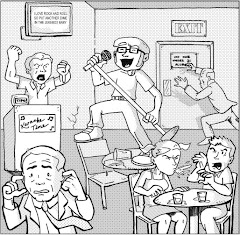Outcasts #1, October 1987, DC Comics
writers: John Wagner & Alan Grant
artists: Cam Kennedy & Steve Montano
colorist: Tom Ziuko
letterer: Augustin Mas
editors: Mike Carlin & Denny O'Neil
I must say, after reading so many comics featuring three, four, or five short stories each lately, I'm grateful for an issue with one linear plot today. Outcasts wasn't my first issue of choice, however. My girlfriend and I went to a comic book shop called the Batcave in Whittier, California this afternoon, where I hoped to pick up some of the latest issues of series I've all but abandoned since this challenge began. I still haven't read what Morrison and Dini are doing for the Batman books, who made the cut in the latest Justice League relaunch, or how the Savage Dragon managed to shake off his coma to fight the interdimensional conqueror Mr. Glum. Unfortunately, the Batcave was simply a mess, with a sparse selection of new releases, and a back issue e section jumbled by stacks of unfiled books and dusty, unpriced toys. On top of it all, when I found a few books I actually wanted to buy, their ATM/credit card machine was down. The poor girl asked if we'd wait ten minutes, but this was after killing time due to the "Out to Lunch, Back in 15 Minutes" sign on the door when we first arrived. Needless to say, that was one Batcave in desperate need for an Alfred. When will comics shop owners learn how to run a retail business? Comics shops are like the outcasts of the successful storefront market.
Fortunately, we killed those 15 minutes with a visit to the hobby shop we first hit when the A Comic A Day challenge began, where I picked up another eclectic batch of books for less than $1.50 each. (No, I haven't completely extinguished by Comic Con swag, but I'm saving a few choice titles for special occasions later this year.) I was drawn to Outsiders because of Alan Grant, one of my favorite Batman/Detective writers, and who also shares credit for Judge Dredd's and Lobo's rise to Reagan era popularity. In my opinion, his work packs an emotional punch often unexpected from a superhero comic. The Outsiders are a reclusive bunch, and although I cannot really sympathize with them, by the end of the issue, I found myself more invested in their future adventures than I would've imagined from a late '80s futuristic romp.
The year: 2049. America (I assume) is socially and economically divided into two distinct factions: the upper class that lives in Enclaves, and the desolate that live in the Grid. The mayor, Boss Angel, has enacted many efforts to eradicate grid-dwellers once and for all, including euthanasia clinics and his latest effort, the exile of all mutants. The brunt of the issue stars one particular mutant, a woman called Kaine, and her attempt to recruit a band of outcasts (hence the name) to rebel against the city. She gathers Shock, whose powers are self-explanatory, B.D. Rickenbracker, a Cyborg knockoff sans the smarts, and Yancy Queeg, who has been cursed with everlasting life. Interestingly, she coerces Queeg with the promise of death, as her touch ages her victims toward decomposition in seconds. I presume that by series' end, he will embrace his existence and continue to aid the oppressed. A hero with a death wish doesn't really conjure much inspiration in others, you know?
Artistically, this issue was standard, on par with other books of its kind from this era. Very Gibbons-ish, by way of The Watchmen. I do admire the artists for avoiding some of the trappings of late '80s comics; fresh from Dark Knight Returns, Grant and Wagner pepper their story with news narrative, that pop commentary that supplies a cultural context to the plot and a shallow perspective for satire's sake. Kennedy and Montero dodged the TV screen shaped panels shtick and simply depicted reporters in the thick of the action, or on a television somewhere in an established setting. I don't know why this element struck me as a visual relief, but the phenomenon speaks to the trends of the time. By the Reagan years, broadcast journalism became less about reporting the news than it was about making some of its own. (I'm looking at you, Geraldo.) Comics were all over that, and in futuristic tales like DKR and Outcasts, these artists took it to the next level.
Since Wagner and Grant's vision of the future is only forty years away at this point, I feel confident suggesting that this story is far from prophetic. As segregated as much of our society still is, we're nowhere near narrowing everyone into only two significant categories. Thank goodness. By the Outcasts' standards, I would need blue skin or a cybernetic implant just to join a super-team. I feel bad enough when a comic book store, presumably my own domain, rejects me . . .
Saturday, September 02, 2006
Subscribe to:
Post Comments (Atom)



No comments:
Post a Comment